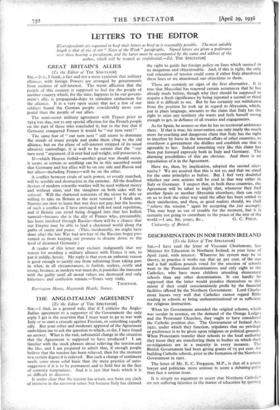LETTERS TO THE EDITOR
[Correspondents are requested to keep their letters as brief as is reasonably possible. The most suitable length is that of one of our "News of the Week" paragraphs. Signed letters are given a preference over those bearing a pseudonym, and the latter must be accompanied by the name and address of the author, which will be treated as confidential.—Ed. THE SPECTATOR]
GREAT BRITAIN'S ALLIES
[To the Editor of THE SPECTATOR] SIR,—It is, I think, a fact and not a mere cynicism that military alliances with foreign Powers are arranged by governments from motives of self-interest. The warm affection that the people of this country is supposed to feel for the people of another country which, for the time, happens to be our govern- ment's ally, is propaganda-dope to stimulate enthusiasm for the alliance. It is a very open secret that not a few of our soldiers found the German people considerably more con- genial than the people of our allies.
The semi-secret military agreement with France prior to 1914 was due, not to any special affection for the French people on the part of those who concluded it, but to the fear that if Germany conquered France it would be "our turn next !"
The same fear of "our turn next" still seems to dominate the minds of many people and make them cling to the old alliance, but on the plane of self-interest stripped of its usual altruistic camouflage, it is well to be certain that the "our turn next "argument, if it ever had real weight, still possesses it.
If—which Heaven forbid—another great war should occur, it seems as certain as anything can be in this unsettled world that Germany and her allies will be on one side and Russia and her allies—including France—will be on the other.
A conflict between rivals of such power, so evenly matched, will be terrible and destructive in the extreme. All the deadliest devices of modern scientific warfare will be used without mercy and without stint, and the slaughter on both sides will be colossal. Will the shattered remnants of the victor be able or willing to take on Britain as the next venture ? I think not. Nations are slow to learn that war does not pay, but the lessons of such a conflict as I have envisaged will not need repetition, and if Britain can avoid being dragged into that last hellish turmoil—because she is the ally of France who, presumably, has been involved through Russia—there will be a chance that our Empire may be able to lead a chastened world along the paths of sanity and peace. (This, incidentally, we might have done after the late War had not fear of the Russian bogey pre- vented us from keeping our promise to disarm down to the level of disarmed Germany.) A reader of this letter may exclaim indignantly that my reason for avoiding a military alliance with France is not, to put it mildly, heroic. My reply is that even an unheroic reason is good enough to justify one from refraining from taking part in what, in all circumstances, is foolish, useless' costly and wrong, because, as modern war must do, it punishes the innocent with the guilty until all moral values are destroyed and only bitterness and confusion remain.—Yours very truly,
TAVISTOCK.
Barrington House, Haywards Heath, Sussex.


























































 Previous page
Previous page